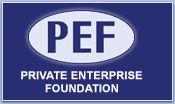Building partnerships between the legislature and the private sector for an accelerated growth of the economy - Auslandsbüro Ghana
Workshop
Details
Building partnerships between the legislature and the private sector for an accelerated growth of the economy
Over the years, the Private Enterprise Foundation (PEF) has actively nurtured partnership between the private sector and government through various initiatives with the view to achieving an accelerated growth of the private sector and thus the economy.
One of the arms of government of key importance to the private sector is the legislature, whose responsibility among others is to shape the legal and regulatory environment which influences the activities of the private sector.
Since the establishment of PEF, Members of Parliament have participated in several stakeholders’ meetings to dialogue and deliberate on policies and government agenda that favor the smooth growth of the private sector.
In December 2008, Ghana elected a new Head of State as well as a new parliament with considerable proportion of new members. PEF with the support of the Konrad-Adenauer-Stiftung is therefore organizing a retreat for members of the Parliamentary Select Committee on Agriculture and selected private sector actors in the agricultural sector with the aim to
- Establish a public-private partnership framework for the next four years to enhance cooperation towards the growth and development of agriculture sector and;
- To strike a working relationship between private sector actors in agriculture and the new members of the Parliamentary Select Committee on Agriculture.
Short Background To The Issue To Be Discussed (The National Agricultural Fund Bill)
It is well known that the Ghanaian economy is dominated by agriculture as a single largest contributor to GDP and that the majority of the Ghanaian population depends on it as a source of their livelihoods. Despite the critical role agriculture plays in development of the Ghanaian economy in general and to the livelihood of the average Ghanaian in particular, the current state of its development leaves a lot to be desired. There is a great potential within the sector which remains untapped. It is estimated that agriculture in Ghana is operating at about 20 percent capacity.
A lot of efforts have been expended since independence aimed at promoting the development of the agricultural sector however given the huge untapped potential within the sector; these efforts need to be greatly amplified. One area that needs a lot of attention is investment in the agricultural sector.
Government’s budgetary allocation to agriculture as a percentage of total discretionary budgetary spending has declined steadily over the past three decades to a current level of about 2 percent. This is woefully inadequate as Ghana’s medium and long term development strategies place emphasis on modernization of agriculture as a basis for industrialization and as a driver of accelerated economic growth.
Credit allocation to the agricultural sector by the financial institutions is equally limited. Before the late 1980s, Government’s intervention in the banking sector ensured that priority sectors such as agriculture were allocated credit. Indeed, the banks were mandated to have a minimum of 20% of total loan portfolio allocated to the agricultural sector. Between the late 1980’s and early 1990’s, government introduced reforms in the financial sector which resulted in the removal of priority sector credit allocation. The impact of the reforms has been such that, the share of agriculture and forestry in the outstanding credit balance of Deposit Money Banks (DMBs) has been falling consistently over the past fifteen years. For example, in December 2006 and 2007, the share of agriculture was 5% and 4% respectively. This is an indication of a low and deteriorating level of credit supply to the agricultural sector.
Against this background, the Private Enterprise Foundation has been undertaking an advocacy process for a National Agricultural Fund to be established in Ghana. PEF sought views from stakeholders in four regional capitals namely Tamale, Kumasi, Cape Coast and Accra as part of the advocacy process. A private sector position paper was developed from views expressed at the stakeholder meetings. The Position Paper served as the basis for the development of a Draft Bill establishing a National Agricultural Fund in Ghana which will be deliberated upon at the retreat.
Date: 26th to 28th June 2009
Venue: Greenland Hotel, Agona Swedru Central Region
For more information contact:
PEF:
Boakye Agarko
Private Enterprise Foundation (PEF)
Accra
Tel: 233-21-515603/ 0244634295
KAS:
Isaac Owusu-Mensah
Konrad-Adenauer-Stiftung (KAS)
Accra
Tel: 233-21-768629/0244329047



